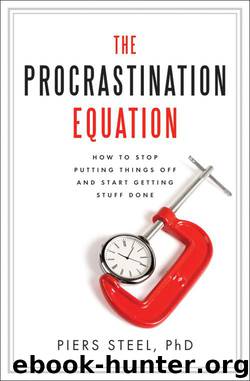The Procrastination Equation by Ph.D. Piers Steel

Author:Ph.D., Piers Steel [Ph.D., Piers Steel]
Language: eng
Format: mobi, epub
Publisher: HarperCollins
Published: 2013-02-21T13:13:03+00:00
• Satiation: Satisfy your needs before they get too intense and distract you from your work. Ironically, you can often work harder if you first schedule in some time for leisure.
• Poison: Add disincentives to your temptations to make them sufficiently unattractive. For example, a monetary bet with someone else that you won’t give in to your temptation can be applied to almost anything.
MAKING PAYING ATTENTION PAY
About the time I was born, the award-winning psychologist Walter Mischel started experimenting on children using marshmallows to test the power of their will.28 In a series of studies, he would offer the kids a marshmallow, but tell them if they could wait a little while, they would get two marshmallows. Some waited a little, others a lot, with the average being about five minutes. The children’s ability to delay gratification and get the larger but later treat proved critical as they grew up. The self-control they exhibited as kids predicted everything from their Scholastic Aptitude Test (SAT) scores to their adult social skills.29 Character is indeed destiny. Subsequently, Mischel tried to change the destiny of a new cohort of children by improving their strategies for dealing with temptations, usually tripling their self-control, getting them to wait three times as long. What was his magic? He simply showed them how to pay attention.
Mischel’s approach to conquering inattention will seem very familiar. As I do for the Procrastination Equation, Mischel emphasizes our mind’s dual nature; procrastination arises from the interplay between our limbic system and our prefrontal cortex. To master attentional control as a means of increasing our self-control, we must first go from the inside out, to change what we see and how we see the world. Second, we go from the outside in, to remove or reinforce external cues, changing the world we see.
INSIDE OUT: PAY ATTENTION PLEASE!
It is time to play a game called “The Unlikely Beast.” It will take precisely a minute. Take out your watch to time yourself and for the entire minute don’t think of a pink elephant. No pink elephants, not even one. Got it? Since you probably didn’t think of any pink elephants today, this should be pretty easy. If you can make it an additional sixty seconds without thinking of pink elephants, you win. Are you ready? Go!
Download
The Procrastination Equation by Ph.D. Piers Steel.epub
This site does not store any files on its server. We only index and link to content provided by other sites. Please contact the content providers to delete copyright contents if any and email us, we'll remove relevant links or contents immediately.
The Compound Effect by Darren Hardy(8949)
Tools of Titans by Timothy Ferriss(8370)
Nudge - Improving Decisions about Health, Wealth, and Happiness by Thaler Sunstein(7694)
Win Bigly by Scott Adams(7184)
Deep Work by Cal Newport(7069)
Rich Dad Poor Dad by Robert T. Kiyosaki(6613)
Principles: Life and Work by Ray Dalio(6422)
Pioneering Portfolio Management by David F. Swensen(6291)
Digital Minimalism by Cal Newport;(5750)
The Barefoot Investor by Scott Pape(5743)
Grit by Angela Duckworth(5609)
The Slight Edge by Jeff Olson(5410)
Discipline Equals Freedom by Jocko Willink(5382)
The Motivation Myth by Jeff Haden(5206)
You Are a Badass at Making Money by Jen Sincero(4925)
The Four Tendencies by Gretchen Rubin(4595)
Eat That Frog! by Brian Tracy(4526)
The Confidence Code by Katty Kay(4252)
Bullshit Jobs by David Graeber(4180)
